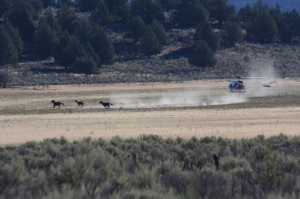Article by Barbara Leonard of the Courthouse News Service
A Dent in BLM Armor brings hope to Nonprofits
SACRAMENTO, Calif. (CN) – A federal judge refused to dismiss wildlife groups’ lawsuit over the federal roundup of more than 1,500 wild horses and burros in northeast California and northwest Nevada.After the Bureau of Land Management concluded in September 2008 that there was an overpopulation of wild horses and burros in the Twin Peaks Herd Management Area, it proceeded to conduct a roundup under the Wild and Free-Roaming Horses and Burros Act.
Before the roundup, the bureau estimated that there were about 2,300 wild horses and more than 200 burros living on the Twin Peaks range, which covers 789,852 acres. The agency felt that the population exceeded appropriate management levels by 1,800 horses and 200 burros. If left alone, the bureau felt that the increasingly unsustainable population would seriously degrade the surrounding environment.
Using helicopters, federal agents extracted 1,637 horses and 160 burros from Sept. 19 to 25, 2010. They later returned 58 horses and one burro to the range, and transferred the remainder to corrals. From there, the animals can either be adopted or transferred to long-term pastures on private lands.
In Defense of Animals, Dreamcatcher Wild Horse and Burro Sanctuary and three individuals sued the U.S. Department of the Interior, the Bureau of Land Management and three officials, alleging violations of the Wild Horse Act, the National Environmental Policy Act and the Administrative Procedures Act. The groups have been entangled in litigation over the roundup since 2009.
They claim that the government captures and releases animals indiscriminately and pays little attention to demographics, such as age and disability, or familial bands.
Another 180 horses were returned to the Twin Peaks, including mares that had received fertility-control treatment, but 15 died, the Eastern District of California found Wednesday.
The government tried to dismiss the complaint, claiming that the plaintiffs lacked standing and that the claims were moot since the roundup had concluded.
“Defendants argue that Plaintiffs’ claimed injury is merely an alleged personal sadness at the effects of Defendants’ actions,” according to the 30-page ruling. “Plaintiffs claim that they have a legally protected right to view horses on the Twin Peaks range. Defendants maintain that neither of these assertions is a legally protected right that would give rise to a viable claim.”
U.S. District Judge Morrison England disagreed, however. It is enough to survive summary judgment that the plaintiffs claim that they have suffered an injury by losing their ability to watch wild horses and burros on the Twin Peaks, and the defendants have yet to prove that the animals were in excess.
“Were this Court to accept Defendants’ proposition that Plaintiffs have no right to view any ‘excess’ wild horses, no plaintiff would ever have standing to challenge Defendant BLM’s removal of ‘excess’ horses, regardless of how flagrant the violation in making that decision,” England wrote. “Defendants have provided no authority for such a proposition.”
The wildlife activists claim that the roundups would have been far more limited, and fewer animals removed from Twin Peaks in the first place, if the government did not violate the laws in question, which they claim prohibit use of long-term holding facilities.
“This Court need not decide at the motion to dismiss stage whether long-term holding is in fact prohibited under the Wild Horse Act,” England wrote. “Assuming, as this Court must, that Plaintiffs are correct in their allegation that long-term holding is statutorily prohibited, Plaintiffs have established the injury-in-fact and causation elements of standing.”
There is also a viable option for relief, since the government can, as the plaintiffs propose, relocate the horses and burros to public lands in the western United States, as opposed to long-term holding facilities in Oklahoma or Kansas.
Mootness is also not an issue since there remains some question as to whether the government has actually concluded the roundup. Litigation may also enable the plaintiffs to enjoin the government from sterilizing the horses and reach other goals
Click (HERE) to read legal documentation
“I attempt to shy away from discussing money and donations in public but I would like to make our readers aware that HfH Advisory Council, Habitat for Horses, the Cloud Foundation, Front Range Equine Rescue, the ASPCA and several private citizens are engaged in a legal wrestling match with the BLM over the above very issue. Right now the West Douglas herd runs free, for the time being, because of these suits but a concise win would force the entire “roundup” issue to be addressed and you can be a part of that victory. Please visit us at www.hfhadvisorycouncil.org to learn more about our fight with the BLM and how we are attempting to put a stop to these illegal roundups, once and for all. Your assistance would be greatly appreciated.” ~ R.T.Related Articles
- Federal Court Gives Green Light To Wild Horse Lawsuit (yubanet.com)
- US judge denies BLM bid to dismiss wild horse suit (sfgate.com)
- BLM to Move 200 Captive Wild Horses from Foul Facility (rtfitch.wordpress.com)
- Report on wild horse conditions being released ()
- US judge denies BLM bid to dismiss wild horse suit (seattletimes.nwsource.com)
- Federal Court Gives Thumbs Up to Wild Horse Suit (rtfitch.wordpress.com)

No comments:
Post a Comment